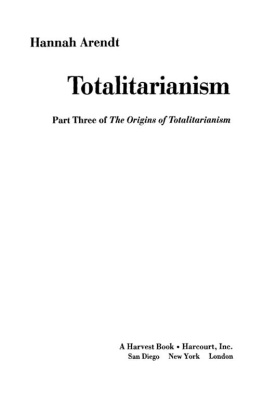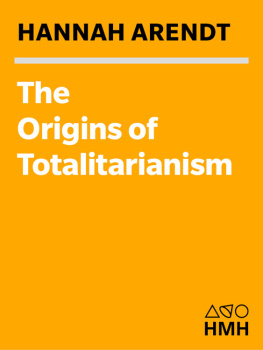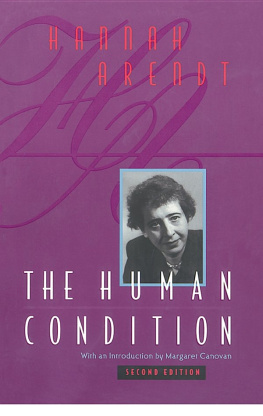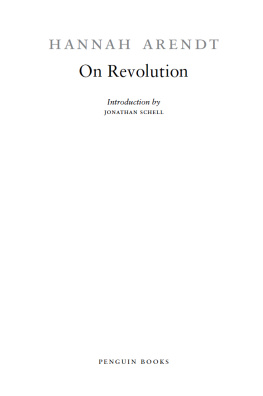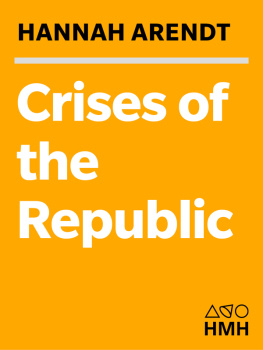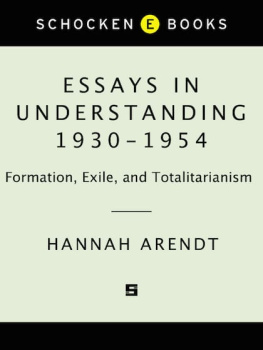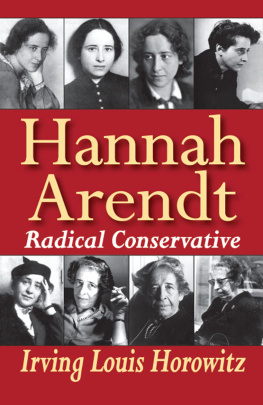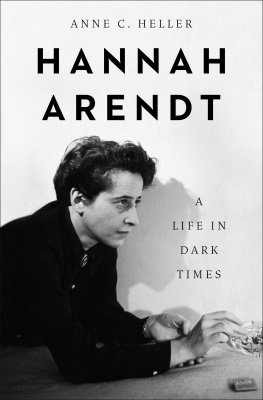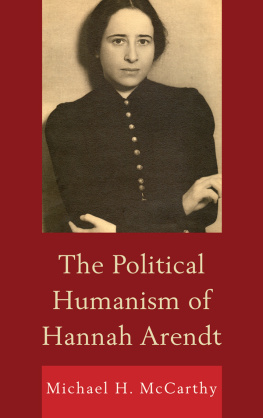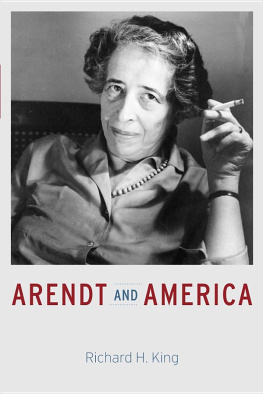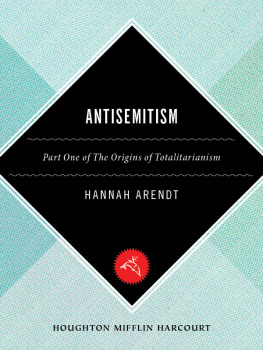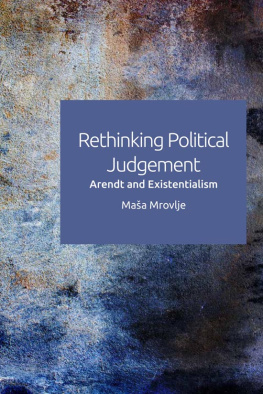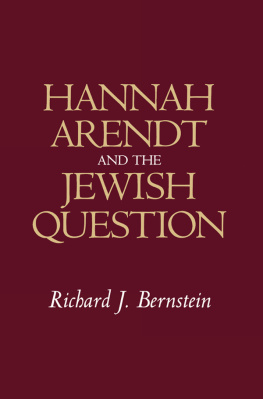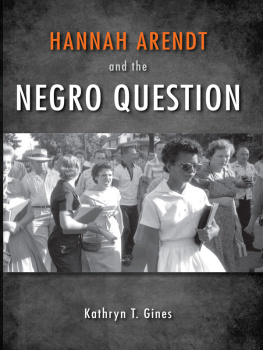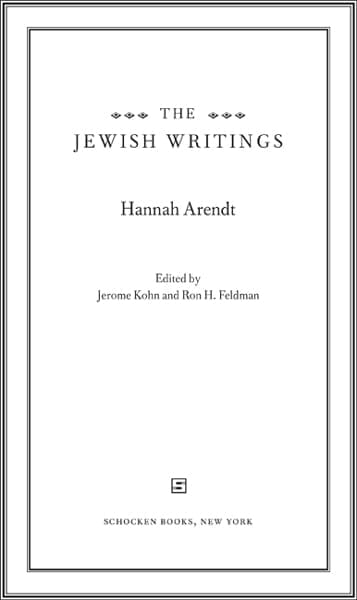PREFACE
A Jewish Life:19061975
Jerome Kohn
The human sense of reality demands that men actualize the sheer passive givenness of their being, not in order to change it but in order to make articulate and call into full existence what otherwise they would have to suffer passively anyhow.
I deliberately begin with a quotation from The Human Condition (1958), unquestionably one of Hannah Arendts most read, studied, and scrutinized works, and one in which there is hardly any mention of Jews, Jewish affairs, or Jewish history. Indeed, the only discussion that might be called Jewish takes place in the books last chapter, The Vita Activa and the Modern Age, in the penultimate section on Life as the Highest Good. There Arendt shows a negative interest in the Decalogue: the way it enumerates the offense of murder, she writes, without any special emphasis, among a number of other transgressions, does not make preservation of life the cornerstone of the legal system of the Jewish people. She goes on to distinguish the Hebrew legal code as occupying an intermediary position between pagan antiquity and all Christian or post-Christian legal systems, a position that may be explicable by the Hebrew creed, she says, which stresses the potential immortality of the people, as distinguished from the pagan immortality of the world on one side and the Christian immortality of individual life on the other.
Although that important distinction is made in the only overtly Jewish passage in The Human Condition, I want to suggest that the sense of the first sentence I quoted from the same workwhich makes the general claim that the human sense of reality demands all human beings to actualize the lie at the root of Arendts thinking and inform her writing even at their most abstract level; yet it is an example with a certain priority, since it deals with the human capacity for action, which initiated political theorizing in the first place, with Plato, and remains, at least for Arendt, its essential or underlying subject (subiectum).
Hannah Arendt was born one hundred years ago in Hannover; when she was three years old she moved with her family to Knigsberg; at eighteen she left home to study philosophy, Protestant theology, and Greek philology at the universities of Marburg, Heidelberg, and Freiburg; four years later she completed her formal studies with a dissertation on The Concept of Love in Augustine. of her peers by responding to them as a Jew, by asserting her Jewishness. That act was first performed in childhood, and would be repeated later in life, when it no longer had anything to do with the accustomed thoughtlessness of children.
From the beginning Arendt found being a Jew special, but in no sense inferior. She looked different from her schoolmates, and, though a German national, she felt a part not of the German but of the Jewish people. Almost half a century later, in a letter to Gershom Scholem included in this volume, she wrote: To be a Jew belongs for me to the indisputable facts of my life, and I never wanted to change or disclaim anything about such facts. Why? Not out of pride, or what Scholem had accused her of lacking, It may be worthwhile to look at these three givens of Arendts being, at their connections and disconnections, in a little more detail.
The need to understand, probably the primary need of Arendts life, can never be fulfilled by thinking alone. For the more the need to understand whatever happens, as she once put it, without doing anything These three things imply three more things of particular concern to us: that the conditions of the activity of thinkingworld-withdrawal and self-reflexivityare utterly distinct, indeed the opposite, from those of the modalities of active life (vita activa); that the thinking ego is not an identical one but a nonidentical two-in-one; and that the actualization of the power of the mind in the activity of thinking differs fundamentally from the actualization of the other givens of Arendts being, that is, from becoming an identifiable woman, who is not sexless or ageless and has plenty of qualities, and an identifiable Jew, whose life story, as it turned out, is well worth telling and retelling.
But things are never simple with Hannah Arendt. Her womanhood may be said to have been first actualized, and also tested, when she fell in love She was nineteen; Heidegger was thirty-six, married with two children, and embarked with his then friend Karl Jaspers on a revolution in philosophy. For Heidegger this meant following a path of thinking that sought to retrieve and bring to consciousness what had long been forgotten in the history of thought, in philosophy as well as the various branches of theoretical and practical knowledge. His thinking probed past thinking, going ever farther back through the history of thought in an effort to dislodge what was unthought at each of its stages. With the force of a magnet, Heidegger drew his students, none more than Arendt, to ask the first, last, and most fundamental question about the being of all entities, the source of thought itself, which the thinking ego in its ongoing, endless activity is not wont to askthat is, not wont to risk silencing its own inner dialogue by hearkening to and heeding the call of being.
The ontological difference between entities and their being does not lead to an understanding of thinkings origin; on the contrary, it points beyond the subject-object distinction, beyond the separation of the entity that understands from anything that can be understood. The passion of Heideggers teaching reveals nothing, nothingness, and caused his loving and most receptive student to experience the reality of the present, the world of existing things, the historical time in which strictly human events occur, and, it may be added, the biographical time in which human substance or character is formed, and is never answered; the fact that it is not answered, in my opinion, holds the key not only to Arendts dissertation but also to the seeming paradox of her changed but lasting love for Martin Heidegger.
But what of her Jewishness? It is that which chiefly concerns us here. We have seen that Arendt considered her Jewishness, the way she appeared to others, a given of her being which she never wanted to change or disclaim; and also that she was called upon to defend her Jewishness as soon as she discovered, through a form of antisemitism, that she was a Jew. Perhaps defending herself as a Jew may be seen as an act inspired by gratitude for the very gift that others denigrated, or perverted, or attempted to rob her of altogether. Be that as it may, neither gift nor gratitude made her Jewishness articulate, or called it into full existence, in anything like the sense that her womanhood was articulated in the experience of love,


